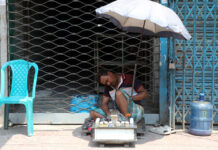
Without any medical education or training, ear-cleaners carry on their activities in Suhrawardy Udyan in the capital. Not endorsed by doctors, the work of these quacks may cause serious damage to ears.
The media can help change perceptions of gender-based violence, and end the culture of acceptance of such violence and the social stigma attached to the victims.
It can also inform people about the facilities available to get justice, said speakers at a roundtable with media editors on “Sexual Harassment, Gender-Based Violence and the Role of Media” at The Daily Star Centre yesterday.
“We need to educate the men in our lives that this [sexual harassment] isn’t appropriate, that we don’t like it and it is, in the end, criminal behaviour,” said US Ambassador in Dhaka Marcia Stephens Bloom Bernicat.
She mentioned a Cornell University study on street harassment in which 31 percent of the men interviewed admitted to perpetuating street harassment. But only 10 percent of them defined their behaviour as harassment.
Eileen O’Connor, deputy assistant US Secretary of State for South and Central Asia, said men should understand the importance of the issue.
O’Connor shared how she had faced sexual harassment in the 1970s and 80s while working as a journalist, but didn’t get any support from the management.
However, things began to change in early 90s after the media extensively covered a law professor’s sexual harassment complaint against a Supreme Court justice nominee, she said.
“In newsrooms across the country, conversations took place about the fact that newsrooms themselves, as I said, were complicit in this activity.”
She recounted how media activism encouraged more women to speak up and report sexual harassment.
Yesterday’s roundtable was organised jointly by Protecting Human Rights Program (PHR) and Women Journalists’ Network of Bangladesh. PHR is a five-year domestic violence prevention and protection initiative funded by the USAID.
PHR is being implemented by Plan Bangladesh in partnership with Bangladesh National Women Lawyer’s Association and 11 local NGOs in 102 unions of six districts.
In his keynote speech, Mahfuz Anam, editor and publisher of The Daily Star, said one of the main reasons for gender-based and sexual violence was undervaluing the role of women in society and in economy.
He noted that the country’s media failed persistently to grasp the importance of the issue and recognise the role of women.
“Media should be much more conscientious in keeping the society accountable, and holding law enforcement agencies accountable for implementation of the law.”
Monjurul Ahsan Bulbul, editor-in-chief and CEO of Boishakhi Television, wondered how many media houses were aware of the 2009 High Court Guidelines on sexual harassment.
Only a few media houses complied with the guidelines and formed complaint committees. Media houses should educate themselves before proceeding to teach others, and be careful about the portrayal of an incident, victims and perpetrators of sexual violence, he said.
News reports should include community experts’ opinions on prevention of such crimes and also community responses to it, he said.
Farida Yasmin, senior journalist of Bangla daily Ittefaq, said political news always got priority over women’s issues in male-dominated newsrooms.
Gitiara Nasreen, professor of mass communications and journalism department at Dhaka University, stressed the need for sensitivity training for journalists, and suggested that more women should be there at policy-making level in media houses.
Khushi Kabir, coordinator of Nijera Kori, said the concept of masculinity should be deconstructed.
“Men should be taught to become human beings and not just men so that they can respect another human being,” she said.
Abul Hossain, project director of Multi-Sectoral Programme on Violence Against Women, said 25,000 women sought help at one stop crisis centres across the country in the last 15 years, and one-third of them rape victims. Of the rapists, only 0.0045 percent was punished.
“Many women withdraw cases because of the lengthy process and lack of evidence,” said the project director of the programme of women and children’s affairs ministry.
He said it was important to preserve evidence, and maintain forensic and DNA laboratories across the country.
Hamida Hossain of Ain o Salish Kendra put emphasis on investigative and follow-up reports.
Source: The Daily Star









